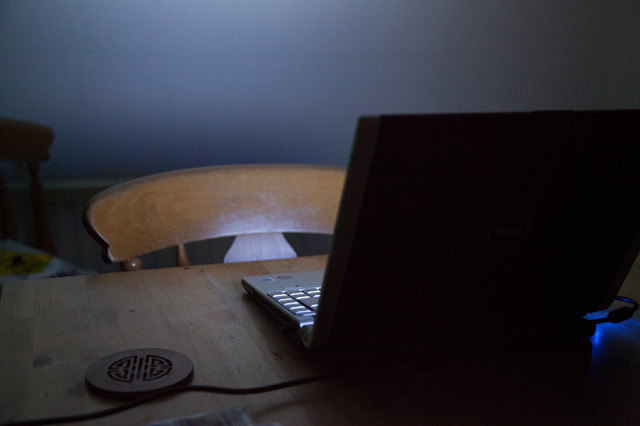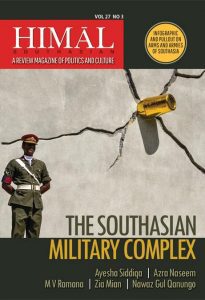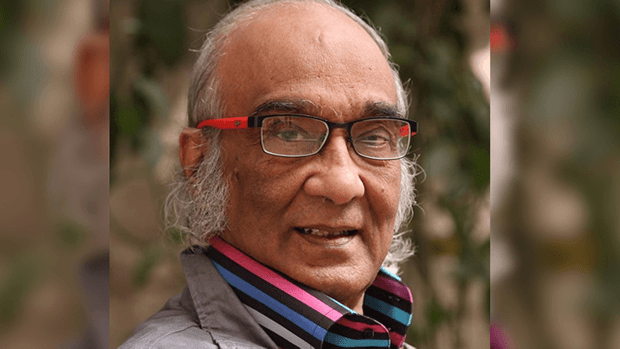Index relies entirely on the support of donors and readers to do its work.
Help us keep amplifying censored voices today.
[vc_row][vc_column][vc_column_text]

Photo: Tom Page/Flickr
This article is from the autumn issue of Index on Censorship magazine, which focuses on anonymity.
I have a name. I am not anonymous. But what if I didn’t have a name? What if I could enjoy the luxury of being safe at home in Bangladesh, and not far away in Germany?
I could have distanced myself from my identity, adopted a pseudonym and continued to write in Bangladesh. Had I done so, my family wouldn’t have to spend each moment in fear and anxiety. My sister wouldn’t have to wake up from nightmares about rape threats. But I am not anonymous. I carry my name and history with me. And so the possibility of an unnatural death haunts me.
Since 2013, my name has surfaced on multiple “hit lists” targeting Bangladeshi bloggers and other activists. I still regularly receive death threats from religious extremists on Facebook and other social media. One simply told me, “It’s your turn now.”
My words often create problems for others. I see myself as writing for the freedom of various groups, for the rights of oppressed communities, for women, for the sexually marginalised. In my debut book Chastity Versus Polygamy, I addressed the patriarchal notion of purity that is assigned to women’s sexuality; this was considered controversial and it enraged many.
I strongly believe that all human beings possess an equal right to express themselves, to assert their ideas and to be recognised for who they are and what they want to be. When the identity of the writer is out in the open, along with a certain level of insecurity comes a burden of responsibility that commits the writer to his or her words. This is why anonymity never appealed to me. I had faith in the democratic setup of my country, Bangladesh. But the state failed to uphold our freedom by suggesting we should stop writing, rather than that terrorism should stop. So I left.
Anonymous bloggers and activists in Bangladesh come from all parts of the ideological spectrum. They include religious radicals, communists, liberals. Unfortunately, certain sections of this anonymous community aim to create chaos, rather than a constructive democratic debate. A number of them publish hate speech, or post videos which are meant to incite violence.
Generally, however, the bloggers are on the receiving end of aggression. Sometimes, even anonymity is no protection. Those who would silence them are often incredibly adept at technological espionage, and can all too easily crack their identities. In March 2015, anonymous atheist blogger Washiqur Rahman Babu was traced and killed in broad daylight outside his residence. Even I didn’t know his identity at the time.
In the face of threats, therefore, going anonymous is hardly a foolproof solution. However, it may not always be feasible to declare one’s identity under dire circumstances, which is the case in many places across the world right now. Anonymity might turn to be one of the necessary shields in the larger, longer battle for free speech.
This article is from the autumn issue of Index on Censorship magazine.
Ananya Azad, a Bangladeshi writer and blogger, is currently in exile in Germany. His father, author Humayun Azad, was the victim of assassination attempts, and later died in mysterious circumstances.
You can order your copy of the latest issue here, or take out a digital subscription via Exact Editions. Copies are also available at the BFI, the Serpentine Gallery, MagCulture, (London), News from Nowhere (Liverpool), Home (Manchester), Calton Books (Glasgow) and on Amazon. Each magazine sale helps Index on Censorship continue its fight for free expression worldwide.
[/vc_column_text][/vc_column][/vc_row][vc_row][vc_column][vc_custom_heading text=”From the Archives”][vc_row_inner][vc_column_inner width=”1/3″][vc_single_image image=”91922″ img_size=”213×289″ alignment=”center” onclick=”custom_link” link=”http://journals.sagepub.com/doi/pdf/10.1177/030642208701600613″][vc_custom_heading text=”Testimony of an ex-censor” font_container=”tag:p|font_size:24|text_align:left” link=”url:http%3A%2F%2Fjournals.sagepub.com%2Fdoi%2Fpdf%2F10.1177%2F030642208701600613|||”][vc_column_text]June 1987
Once a censor in the Syrian Ministry of Information, the anonymous source details the invasion of privacy and censorship the government employs.[/vc_column_text][/vc_column_inner][vc_column_inner width=”1/3″][vc_single_image image=”80637″ img_size=”213×289″ alignment=”center” onclick=”custom_link” link=”http://journals.sagepub.com/doi/pdf/10.1177/0306422015591456″][vc_custom_heading text=”Blogging in Bangladesh” font_container=”tag:p|font_size:24|text_align:left” link=”url:http%3A%2F%2Fjournals.sagepub.com%2Fdoi%2Fpdf%2F10.1177%2F0306422015591456|||”][vc_column_text]June 2015
A series of murders of secular bloggers by religious fundamentalists in has presented clear warnings for bloggers to watch what they say.[/vc_column_text][/vc_column_inner][vc_column_inner width=”1/3″][vc_single_image image=”89164″ img_size=”213×289″ alignment=”center” onclick=”custom_link” link=”http://journals.sagepub.com/doi/pdf/10.1177/0306422010362466″][vc_custom_heading text=”Egyptian gate to freedom” font_container=”tag:p|font_size:24|text_align:left” link=”url:http%3A%2F%2Fjournals.sagepub.com%2Fdoi%2Fpdf%2F10.1177%2F0306422010362466|||”][vc_column_text]March 2010
Mohamed Khaled reports that the Egyptian government continues to harass bloggers, but they’ve become a vital source of information even for the state media. [/vc_column_text][/vc_column_inner][/vc_row_inner][vc_separator][/vc_column][/vc_row][vc_row][vc_column width=”1/3″][vc_custom_heading text=”The unnamed” font_container=”tag:p|font_size:24|text_align:left” link=”url:%20https%3A%2F%2Fwww.indexoncensorship.org%2F2017%2F09%2Ffree-to-air%2F|||”][vc_column_text]The autumn 2016 Index on Censorship magazine explores topics on anonymity through a range of in-depth features, interviews and illustrations from around the world.
With: Valerie Plame Wilson, Ananya Azad, Hilary Mantel[/vc_column_text][/vc_column][vc_column width=”1/3″][vc_single_image image=”80570″ img_size=”medium” alignment=”center” onclick=”custom_link” link=”https://www.indexoncensorship.org/2016/11/the-unnamed/”][/vc_column][vc_column width=”1/3″][vc_custom_heading text=”Subscribe” font_container=”tag:p|font_size:24|text_align:left” link=”url:https%3A%2F%2Fwww.indexoncensorship.org%2Fsubscribe%2F|||”][vc_column_text]In print, online. In your mailbox, on your iPad.
Subscription options from £18 or just £1.49 in the App Store for a digital issue.
Every subscriber helps support Index on Censorship’s projects around the world.
![]() SUBSCRIBE NOW[/vc_column_text][/vc_column][/vc_row]
SUBSCRIBE NOW[/vc_column_text][/vc_column][/vc_row]
 One of South Asia’s most influential news magazines, Himal Southasian, is to close next month after 29 years of publishing as part of a clampdown on freedom of expression across the region. The magazine has a specific goal: to unify the divided countries in South Asia by informing and educating readers on issues that stretch throughout the region, not just one community.
One of South Asia’s most influential news magazines, Himal Southasian, is to close next month after 29 years of publishing as part of a clampdown on freedom of expression across the region. The magazine has a specific goal: to unify the divided countries in South Asia by informing and educating readers on issues that stretch throughout the region, not just one community.
Index got a chance to speak with Himal Southasian’s editor, Aunohita Mojumdar, on the vital role of independent media in South Asia, the Nepali government’s complicated way of silencing activists and what the future holds for journalism in the region.
“The means used to silence us are not straightforward but nor are they unique,” Mojumdar said. “Throughout the region one sees increasing use of regulatory means to clamp down on freedom of expression, whether it relates to civil society activists, media houses, journalists or human rights campaigners.”
Himal Southasian, which claims to be the only analytical and regional news magazine for South Asia, faced months of bureaucratic roadblocks before the funding for the magazine’s publisher, the Southasia Trust, was cut off due to non-cooperation by regulatory state agencies in Nepal, said the editor. This is a common tactic among the neighbouring countries as governments are wary of using “direct attacks or outright censorship” for fear of public backlash.
But for Nepal it wasn’t always this way. “Nepal earlier stood as the country where independent media and civil society not accepted by their own countries could function fearlessly,” Mojumdar said.
In a statement announcing its suspension of publication as of November 2016, Himal Southasian explained that without warning, grants were cut off, work permits for editorial staff became difficult to obtain and it started to experience “unreasonable delays” when processing payments for international contributors. “We persevered through the repercussions of the political attack on Himal in Parliament in April 2014, as well as the escalating targeting of Kanak Mani Dixit, Himal’s founding editor and Trust chairman over the past year,” it added.
Index on Censorship: Why is an independent media outlet like Himal Southasian essential in South Asia?
Aunohita Mojumdar: While the region has robust media, much of it is confined in its coverage to the boundaries of the nation-states or takes a nationalistic approach while reporting on cross-border issues. Himal’s coverage is based on the understanding that the enmeshed lives of almost a quarter of the world’s population makes it imperative to deal with both challenges and opportunities in a collaborative manner.
The drum-beating jingoism currently on exhibit in the mainstream media of India and Pakistan underline how urgent it is for a different form of journalism that is fact-based and underpinned by rigorous research. Himal’s reportage and analysis generate awareness about issues and areas that are underreported. It’s long-form narrative journalism also attempts to ensure that the power of good writing generates interest in these issues. Based on a recognition of the need for social justice for the people rather than temporary pyrrhic victories for the political leaderships, Himal Southasian brings journalism back to its creed of being a public service good.
Index: Did the arrest of Kanak Mani Dixit, the founding editor for Himal Southasian, contribute to the suspension of Himal Southasian or the treatment the magazine received from regulatory agencies?
Mojumdar: In the case of Himal or its publisher the non-profit Southasia Trust, neither entity is even under investigation. We can only surmise that the tenuous link is that the chairman of the trust, Kanak Mani Dixit, is under investigation since we have received no formal information. Informally we have indeed been told that there is political pressure related to the “investigation” which prevents the regulatory bodies from providing their approval.
The lengthy process of this denial – we had applied in January 2016 for the permission to use a secured grant and in December 2015 for the work permit, effectively diminished our ability to function as an organisation until the point of paralysis. While the case against Dixit is itself contentious and currently sub judice, Himal has not been intimated by any authority that it is under any kind of scrutiny. On the contrary, regulatory officials inform us informally that we have fulfilled every requirement of law and procedure, but cite political pressure for their inability to process our requests. Our finances are audited independently and the audit report, financial statements, bank statements and financial reporting are submitted to the Nepal government’s regulatory bodies as well as to the donors.
Index: Why is Nepal utilising bureaucracy to indirectly shut down independent media? Why are they choosing indirect methods rather than direct censorship?
Mojumdar: The means used to silence us are not straightforward but nor are they unique. Throughout the region one sees increasing use of regulatory means to clamp down on freedom of expression, whether it relates to civil society activists, media houses, journalists or human rights campaigners. Direct attacks or outright censorship are becoming rarer as governments have begun to fear the backlash of public protests.
Index: With the use of bureaucratic force to shut down civil society activists and media growing in Nepal, how does the future look for independent media in South Asia?
Mojumdar: This is actually a regional trend. However, while Nepal earlier stood as the country where independent media and civil society not accepted by their own countries could function fearlessly, the closing down of this space in Nepal is a great loss. As a journalist I myself was supported by the existence of the Himal Southasian platform. When the media of my home country, India, were not interested in publishing independent reporting from Afghanistan, Himal reached out to me and published my article for the eight years that I was based in Kabul as a freelancer. We are constantly approached by journalists wishing to write the articles that they cannot publish in their own national media.
The fact that regulatory means to silence media and civil society is meeting with such success here and that an independent platform is getting scarce support within Nepal’s civil society will also be a signal for others in power wishing to use the same means against voices of dissent.
It is a struggle for the media to be independent and survive. In an era where corporate interests increasingly drive the media’s agenda, it is important for all of us to reflect on what we can all do to ensure the survival of small independent organisations, many of which, like us, face severe challenges.
[vc_row][vc_column][vc_custom_heading text=”Does anonymity need to be defended? Contributors include Hilary Mantel, Can Dündar, Valerie Plame Wilson, Julian Baggini, Alejandro Jodorowsky and Maria Stepanova “][vc_row_inner][vc_column_inner width=”1/2”][vc_column_text]
[/vc_column_text][/vc_column_inner][vc_column_inner width=”1/2″][vc_single_image image=”78078″ img_size=”full”][/vc_column_inner][/vc_row_inner][vc_column_text]
[/vc_column_text][/vc_column][/vc_row][vc_row][vc_column][vc_custom_heading text=”SPECIAL REPORT: THE UNNAMED” css=”.vc_custom_1483445324823{margin-right: 0px !important;margin-left: 0px !important;border-bottom-width: 1px !important;padding-top: 15px !important;padding-bottom: 15px !important;border-bottom-color: #455560 !important;border-bottom-style: solid !important;}”][vc_column_text]
[/vc_column_text][/vc_column][/vc_row][vc_row][vc_column][vc_custom_heading text=”IN FOCUS” css=”.vc_custom_1481731813613{margin-right: 0px !important;margin-left: 0px !important;border-bottom-width: 1px !important;padding-top: 15px !important;padding-bottom: 15px !important;border-bottom-color: #455560 !important;border-bottom-style: solid !important;}”][vc_column_text]
[/vc_column_text][/vc_column][/vc_row][vc_row][vc_column][vc_custom_heading text=”CULTURE” css=”.vc_custom_1481731777861{margin-right: 0px !important;margin-left: 0px !important;border-bottom-width: 1px !important;padding-top: 15px !important;padding-bottom: 15px !important;border-bottom-color: #455560 !important;border-bottom-style: solid !important;}”][vc_column_text]
[/vc_column_text][/vc_column][/vc_row][vc_row][vc_column][vc_custom_heading text=”COLUMNS” css=”.vc_custom_1481732124093{margin-right: 0px !important;margin-left: 0px !important;border-bottom-width: 1px !important;padding-top: 15px !important;padding-bottom: 15px !important;border-bottom-color: #455560 !important;border-bottom-style: solid !important;}”][vc_column_text]
[/vc_column_text][/vc_column][/vc_row][vc_row][vc_column][vc_custom_heading text=”END NOTE” css=”.vc_custom_1481880278935{margin-right: 0px !important;margin-left: 0px !important;border-bottom-width: 1px !important;padding-top: 15px !important;padding-bottom: 15px !important;border-bottom-color: #455560 !important;border-bottom-style: solid !important;}”][vc_column_text]
[/vc_column_text][/vc_column][/vc_row][vc_row][vc_column][vc_custom_heading text=”SUBSCRIBE” css=”.vc_custom_1481736449684{margin-right: 0px !important;margin-left: 0px !important;border-bottom-width: 1px !important;padding-bottom: 15px !important;border-bottom-color: #455560 !important;border-bottom-style: solid !important;}”][vc_column_text]Index on Censorship magazine was started in 1972 and remains the only global magazine dedicated to free expression. Past contributors include Samuel Beckett, Gabriel García Marquéz, Nadine Gordimer, Arthur Miller, Salman Rushdie, Margaret Atwood, and many more.[/vc_column_text][vc_row_inner][vc_column_inner width=”1/2″][vc_single_image image=”76572″ img_size=”full”][/vc_column_inner][vc_column_inner width=”1/2″][vc_column_text]In print or online. Order a print edition here or take out a digital subscription via Exact Editions.
Copies are also available at the BFI, the Serpentine Gallery, MagCulture, (London), News from Nowhere (Liverpool), Home (Manchester), Calton Books (Glasgow) and on Amazon. Each magazine sale helps Index on Censorship continue its fight for free expression worldwide.
![]() SUBSCRIBE NOW[/vc_column_text][/vc_column_inner][/vc_row_inner][/vc_column][/vc_row][vc_row][vc_column][vc_basic_grid post_type=”post” max_items=”4″ element_width=”6″ grid_id=”vc_gid:1483444808560-b79f752f-ec25-7″ taxonomies=”8927″ exclude=”80882″][/vc_column][/vc_row]
SUBSCRIBE NOW[/vc_column_text][/vc_column_inner][/vc_row_inner][/vc_column][/vc_row][vc_row][vc_column][vc_basic_grid post_type=”post” max_items=”4″ element_width=”6″ grid_id=”vc_gid:1483444808560-b79f752f-ec25-7″ taxonomies=”8927″ exclude=”80882″][/vc_column][/vc_row]

Shafik Rehman (Photo: Reprieve)
Anisul Huq
Minister for Law, Justice and Parliamentary Affairs
Government of Bangladesh
Bangladesh Secretariat, Building No. 4 (7th Floor) Dhaka-100
4 August 2016
Dear Mr Huq,
We are writing to you as international press freedom, freedom of expression and media advocacy groups about the ongoing detention of Shafik Rehman, an elderly journalist in custody in Dhaka, to set out several serious concerns about his treatment.
We were pleased to note that on Sunday 17 July 2016 the Supreme Court granted Mr Rehman’s request for leave to appeal his detention.
Detention without charge
Mr Rehman was arrested on 16 April 2016 and denied bail by the High Court on 7 June 2016. After more than three months in detention, he has still not been charged with any crime.
He is being investigated by the Bangladesh Detective Branch, who entered his house without a warrant, inexplicably posing as a camera crew, on the day of his arrest.
The detectives missed a deadline on 16 June 2016 to submit a report to Metropolitan Magistrate SM Masud Zaman in Dhaka outlining the alleged case against Mr Rehman. The court extended the deadline until 26 July 2016, despite the fact that the First Information Report in this case was initially filed in August 2015 and the investigation period in the case has expired. On 26 July 2016, the police once again missed the deadline to submit their investigation report and a further deadline has now been set for 30 August 2016 – more than 100 days after his arrest.
Under international law, the Bangladesh authorities have a duty to promptly inform Mr Rehman of the nature of the case against him and either charge or release him. The delays in this case suggest that there is no evidence against Mr Rehman, and that he should be released.
Journalistic career
Mr Rehman is a professional journalist who has spent a lifetime working for freedom of expression. We are concerned that his arrest represents an attack on press freedoms and forms part of a worrying trend in Bangladesh. At the time of his arrest, Mr Rehman was editor of the popular monthly magazine Mouchake Dhil, with experience as a TV host and producer. Previously, he has worked for the BBC and edited Jai Jai Din, a mass- circulation Bengali daily.
The arrest of journalists like Mr Rehman raises concerns about the state of press freedoms in Bangladesh, where several prominent editors have been arrested in recent years.
Denied bail
Mr Rehman is an elderly man in poor health. He spent the first weeks of detention in solitary confinement, without a bed. His health deteriorated and he was rushed to hospital.
His family are seriously concerned about his health failing in prison, and he has missed important medical appointments while on remand.
There are therefore strong compassionate grounds for releasing Mr Rehman on bail, while any evidence (if there is any at all) can be gathered without jeopardising his health.
We hope that Mr Rehman’s appeal will be an opportunity for the Court to take stock of the serious concerns about the case against Mr Rehman and about his health and well-being while he remains in custody.
We appreciate you hearing our concerns and are grateful for swift action to guarantee Mr Rehman’s prompt release.
Yours sincerely,
Reprieve | Index on Censorship | International Federation of Journalists | Reporters Without Borders | Adil Soz – International Foundation for Protection of Freedom of Speech | Afghanistan Journalists Center | Americans for Democracy and Human Rights in Bahrain | Bahrain Center for Human Rights | Canadian Journalists for Free Expression | Center for Media Freedom and Responsibility | Foro de Periodismo Argentino | Free Media Movement | Independent Journalism Center – Moldova | Institute for the Studies on Free Flow of Information | International Press Institute | Media, Entertainment and Arts Alliance | Media Foundation for West Africa | National Union of Somali Journalists | Norwegian PEN | Pacific Freedom Forum | Pacific Islands News Association | Pakistan Press Foundation | Palestinian Center for Development and Media Freedoms – MADA | PEN American Center | Public Association “Journalists” | Vigilance pour la Démocratie et l’État Civique
Via post to:
High Commission for the People’s Republic of Bangladesh
28 Queen’s Gate
London
SW7 5JA
Add your voice: Call on Bangladesh to free British journalist Shafik Rehman https://t.co/sslk4GsISX @Reprieve pic.twitter.com/CpXvOWpQ6U
— Index on Censorship (@IndexCensorship) August 10, 2016